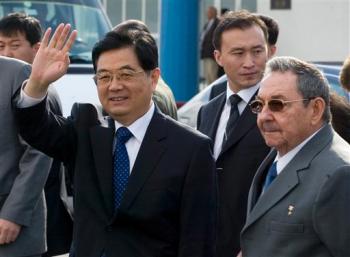
Hu launched free trade talks on a visit to Costa Rica, before flying to a rapturous reception in Cuba. This week he will also be one of the stars at a Pacific rim summit of 21 nations in Peru. By then, Beijing's delegation will have grown to 600 people, including 12 ministers.
"China's relations with Latin America and the Caribbean have never been so close," Hu told Peru's El Comercio newspaper.
In contrast to Russia's politically charged push into the region - which involves selling arms and challenging US influence - Beijing's focus is on agriculture, raw materials and markets for its exports.
China's trade with Latin America has risen tenfold to $102bn (£68bn), and it has toppled the US as Chile's main trading partner since 2000, although the US remains the region's main economic partner, with $560bn in trade last year.
Cuba's state news agency reported that Hu signed almost a dozen agreements with Cuba, including plans to upgrade infrastructure and buy sugar and nickel. China hopes to sign a free trade deal this week with Peru to obtain better access to its copper and iron deposits. There is already a $2.2bn deal to extract 7m tonnes of copper from a single Peruvian peak.
In Brazil, the Chinese are negotiating to build a $3bn steel mill with help from the Bank of China, which is to open a branch there next year. China has also sunk billions into oil exploration in Ecuador, Colombia and Venezuela.
China has wooed several Latin America states away from its rival, Taiwan. As a reward, Costa Rica is to receive a $300m soft loan, help with building a 30,000-seat stadium and modernising an oil refinery. In a symbolic step, China last month invested $350m in the Inter-American Development Bank, a signal that it wants to be a long-term player in the region.
As China's clout grows, that of the US dwindles. The economic slowdown is expected to hit Latin American exports to the US, as well as remittances from Latino migrants.
"The reality is that to some degree the fate of Latin America has been decoupled from the US," Daniel Erickson, of the Inter-American Dialogue thinktank, told the Associated Press. "Or at least it's not as tightly entwined as it used to be."